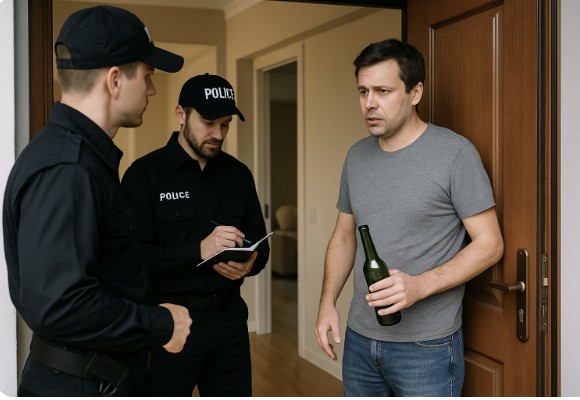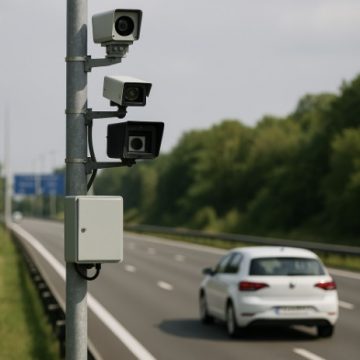🚔 Caught Driving Under the Influence: Can the Police Really Show Up at Your Home?
Several drivers in Wallonia have reported a rather surprising experience:
a few days after testing positive for alcohol or drugs during a roadside check, police officers showed up at their homes — not to arrest them, but to “see if they drink often.”
These visits are sometimes described as part of a so-called “moral investigation.”
But what exactly does that mean?
And more importantly — are they allowed to enter your home?
Let’s break it down 👇
🕵️♂️ Yes, Some Police Units Conduct “Moral Investigations”
In certain parts of Wallonia, particularly under the Liège and Luxembourg public prosecutors, local police officers have reportedly been asked to carry out brief home visits after a positive alcohol or drug test.
🎯 The official reason:
to help the police court judge understand whether the driver’s alcohol use is part of a broader pattern or simply a one-time mistake.
In practice, this can mean:
-
a few questions about your drinking habits,
-
a quick look around your home,
-
and a short report sent to the prosecutor’s office.
👉 This practice is not widespread.
Other prosecutors (like Namur/Dinant) have confirmed they do not ask for such visits.
⚖️ The Legal Framework: Your Home Is Protected by Law
And this is where things get tricky.
While the goal may be legitimate, the method raises important legal questions.
🏠 In Belgium, No One Enters Your Home Without a Legal Basis
Article 15 of the Belgian Constitution is crystal clear:
“The home is inviolable; no home visit may take place except in the cases provided by law and in the form it prescribes.”
That means:
-
Without a judicial warrant,
👉 police cannot enter your home without your explicit consent. -
If you agree, your consent must be free, informed, and specific.
-
You can withdraw that consent at any time — even if the officers are already inside.
In other words, you are fully entitled to refuse entry if there is no warrant.
💬 What If You Do Let Them In?
Your consent can be limited. You can, for instance, say:
“You may come into the hallway, but I prefer that you do not enter the rest of the house.”
If the police start looking around, taking photos, or making notes without your permission,
those actions can later be challenged in court and excluded from the file.
👩⚖️ What the Judge Really Looks At
When you appear before the police court, what truly matters is:
-
your blood alcohol level,
-
any visible signs of intoxication (speech, balance, demeanor),
-
possible prior offenses,
-
and in serious cases, medical or psychological assessments.
A “moral investigation” does not prove anything.
At best, it provides context.
As one Liège lawyer specializing in traffic law explains:
“This type of investigation may add color to a file, but it’s not real evidence.
What counts is the alcohol level and the driver’s condition at the time.”
⚡ Why Do These Investigations Exist?
Prosecutors say the aim is to better assess risk —
to avoid giving back a driver’s license too quickly to someone who might reoffend.
However, this raises serious concerns:
-
Where’s the line between a context check and an intrusive search?
-
Was consent truly freely given?
-
And is this approach proportionate and lawful?
Even if well-intentioned, the practice sits in a grey legal zone that deserves scrutiny.
📝 What to Do If the Police Show Up at Your Door
Even if the visit seems friendly, remember: your home is protected by law.
Here’s how to handle it calmly and confidently 👇
✅ Your 5 Smart Reflexes
-
Stay polite and calm.
Anger won’t help — composure always works in your favor. -
Ask why they’re there.
“Can you explain the legal basis of this visit and who requested it?”
-
No warrant? You can refuse.
“Without a judicial warrant, I prefer not to authorize any home visit.
I’m happy to provide information in writing or through my lawyer.” -
If you agree, set clear boundaries.
“You may step into the hallway, but please don’t look around the rest of the house.”
-
Take notes.
Record the date, officers’ names, and what they did or asked —
that record may be useful if you need to challenge the visit later.
🧑⚖️ A Calm Way to Say No
“I understand your mission, but without a warrant I do not consent to a home visit.
I’ll cooperate through my lawyer or upon formal request from the prosecutor’s office.”
⚠️ Remember
-
Refusing entry is not an offense.
-
Your consent must be explicit and voluntary.
-
Without a warrant or valid consent, no inspection or search can legally take place.
-
If it does, a lawyer can request the exclusion of the evidence collected.
🚗 In Summary
| Situation | Your Rights |
|---|---|
| Police knock for a “moral investigation” | You can refuse entry |
| No warrant, but insistence | Refusal has no legal consequences |
| Search or inspection without your approval | Possible violation of home privacy |
| Court proceedings | What counts is your alcohol level, not “moral character” |
💬 Final Thoughts
“Moral investigations” may exist, but they’re not automatic — and their legal basis is shaky.
They might help a prosecutor understand context, but they don’t replace facts, evidence, or due process.
In Belgium, your home remains legally protected, and your consent is your safeguard.
If you’re ever unsure, it’s perfectly appropriate to say:
“I prefer to speak to my lawyer first.”
📩 Need Personal Advice?
Every case is different.
If you’ve been contacted by the police after a DUI check, or simply want to understand your legal rights in traffic law,
👉 contact me
I’ll help you clarify your situation, assert your rights, and build the most effective legal strategy for your case.




